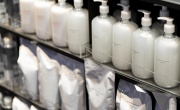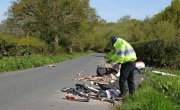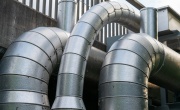Liquid restriction at UK airports results in vast amounts of waste at security checkpoints
The restriction on the amount of liquid allowed onto aeroplanes still results in a large amount of liquid waste being dumped at airport security checkpoints, despite such restrictions having been in place for 10 years.
Bristol Evening Post recently reported that up to 14 full bin bags a day, the equivalent of nearly 1,000 bottles of liquid, are produced by passengers leaving their liquid waste at security in Bristol Airport, also causing delays at security.
Changes to the amounts of liquid passengers can carry aboard a plane were introduced in 2006, following the interception of a plot to take liquid explosives onto a passenger plane heading for the US and Canada.

A high-profile advertising campaign was launched to inform passengers that only items of 100 millilitres (ml) or less would be allowed on board and should be placed into a clear resealable bag for inspection at security.
Despite this, many passengers who pass through UK airports every year are still unaware of the liquid restriction at airport security. According to Bristol Airport, over 150,000 items including water bottles, jars, gels and aerosols will be left at Bristol’s security checkpoints alone over the summer months.
In 2015, Bristol Airport produced a total of 1,600 tonnes of waste, the equivalent of 0.24 kilogrammes (kg) per passenger, but the airport tries to make sure as many items as possible are recycled.
According to the airport’s annual operations monitoring report, 98 per cent of waste produced was recycled or reprocessed, an increase from the 95 per cent diverted from landfill in 2014, with 62.79 tonnes of food sent for waste to energy recovery.
The bigger the airport the bigger the problem
This follows on from figures released by the Manchester Airports Group (MAG) on the tenth anniversary of the introduction of airport liquid restriction.
The figures suggested that over 140 million tonnes of bottled drinks were collected at security checkpoints last year at MAG sites, including Manchester, Stansted, Bournemouth and East Midlands airports, which collectively serve around 42 million passengers annually.
Airport staff at Manchester and Stansted airports are reportedly filling a total of 150 wheeled bins every day with over 500,000 drinks bottles, sun cream, jars, perfumes and cosmetics amongst other items, with around 20 per cent of security trays being rejected due to liquid breaches.
Every year, over 19 million passengers pass through Manchester airport alone, which is the third busiest UK airport after Gatwick and Heathrow. The site provides facilities for recycling 13 different materials and sends its residual waste to an energy recovery facility.
Manchester airport currently bales recyclables on site to reduce costs and emissions and has vowed to no longer send any waste to landfill after 2015.
Rules for avoiding liquid waste at airport security
MAG has released some guidelines for travellers in an attempt to reduce the amount of waste produced at security checkpoints:
· containers must hold no more than 100ml;
· containers must be in a single, transparent, re-sealable plastic bag, which holds no more than a litre and measures approximately 20cm x 20cm;
· contents must fit comfortably inside the bag so it can be sealed;
· the bag must not be knotted or tied at the top; and
· passengers are limited to one plastic bag per person.
“Worst possible start to someone’s holiday”
Daniel Gallo, Customer Services and Security Director at London Stansted Airport, said: “Having to throw away items at security can often mean the worst possible start to someone’s holiday, and I encourage passengers to remember to put those expensive sun creams and perfumes in their hold luggage. The message is clear: passengers should pack these items in their hold luggage if they can, or if not, ensure that they are in packages of less than 100ml.
“Every security officer has a long list of items that they have to discard day in, day out ranging from jars of marmite and bottles of HP sauce to snowglobes and bubble machines. We’d much rather our passengers were able to keep hold of these and don’t attempt to take them through security before boarding their flight.”
More information about the challenges of recycling at airports can be found in Resource’s feature profile of Stansted airport.






